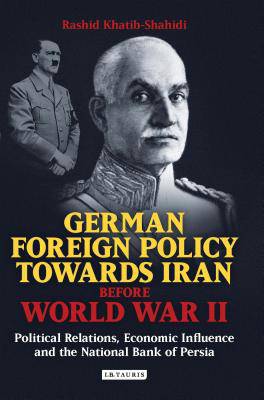
- Afhalen na 1 uur in een winkel met voorraad
- Gratis thuislevering in België vanaf € 30
- Ruim aanbod met 7 miljoen producten
- Afhalen na 1 uur in een winkel met voorraad
- Gratis thuislevering in België vanaf € 30
- Ruim aanbod met 7 miljoen producten
Zoeken
German Foreign Policy Towards Iran Before World War II
Political Relations, Economic Influence and the National Bank of Persia
Rashid Khatib-Shahidi
€ 135,95
+ 271 punten
Omschrijving
Early twentieth-century Iran had been dominated by the competing influences of the two great imperial powers of the time - Russia and Britain - making it difficult for a third power to establish a foothold. But an emergent, highly industrialised and assertive Germany in the 1930s became an attractive ally through which Iran could cut loose from domination by Britain and the Soviet Union, allowing it to seek modernity outside the constraints of old imperial interests. This led to the development of close commercial ties between Reza Shah's Persia and Hitler's Germany in the interwar period, an aspect of German foreign policy that is often overlooked. It was the National Bank of Persia, established in 1927 under German management, and with Kurt Lindenblatt as its governor, that was to be the vehicle for Germany's commercial expansion into Iran. The Bank was a vital engine driving industrialisation, even after Lindenblatt retired and was followed by Gholam Reza Amir-Khosrari and a board of directors including Hossein Ala and Abdul Hossein Hazhir.
By the mid-1930s, a new German foreign policy approach of active diplomacy fortified initial inroads into the Iranian economy, building upon the foundations laid by individual entrepreneurs, the National Bank and the construction of the Trans-Iranian Railway. Iran evolved into an attractive country for international trade and, at the outbreak of World War II, Germany was Iran's largest trading partner - surpassing both the Soviet Union and Britain. These close ties reveal a complex relationship between Germany and Iran, and an admiration of the Nazi's brand of industrial, scientific and organisational progress. It was, however, a relationship that came to an abrupt end with the Allied invasion of Iran in 1941 that deposed the Shah. Khatib-Shahidi delves into previously untapped German primary sources to explore the nature of German involvement in Iran between the wars, examining how it came to be moulded by a handful of individuals. This book is a revealing resource on the historical ties between Iran and Germany, making it indispensable for students and researchers of European Imperialism and Colonialism in the Middle East as well as of Iranian Political and Economic History.
By the mid-1930s, a new German foreign policy approach of active diplomacy fortified initial inroads into the Iranian economy, building upon the foundations laid by individual entrepreneurs, the National Bank and the construction of the Trans-Iranian Railway. Iran evolved into an attractive country for international trade and, at the outbreak of World War II, Germany was Iran's largest trading partner - surpassing both the Soviet Union and Britain. These close ties reveal a complex relationship between Germany and Iran, and an admiration of the Nazi's brand of industrial, scientific and organisational progress. It was, however, a relationship that came to an abrupt end with the Allied invasion of Iran in 1941 that deposed the Shah. Khatib-Shahidi delves into previously untapped German primary sources to explore the nature of German involvement in Iran between the wars, examining how it came to be moulded by a handful of individuals. This book is a revealing resource on the historical ties between Iran and Germany, making it indispensable for students and researchers of European Imperialism and Colonialism in the Middle East as well as of Iranian Political and Economic History.
Specificaties
Betrokkenen
- Auteur(s):
- Uitgeverij:
Inhoud
- Aantal bladzijden:
- 240
- Taal:
- Engels
- Reeks:
Eigenschappen
- Productcode (EAN):
- 9781848853249
- Verschijningsdatum:
- 15/04/2013
- Uitvoering:
- Hardcover
- Formaat:
- Genaaid
- Afmetingen:
- 140 mm x 216 mm
- Gewicht:
- 430 g

Alleen bij Standaard Boekhandel
+ 271 punten op je klantenkaart van Standaard Boekhandel
Beoordelingen
We publiceren alleen reviews die voldoen aan de voorwaarden voor reviews. Bekijk onze voorwaarden voor reviews.








